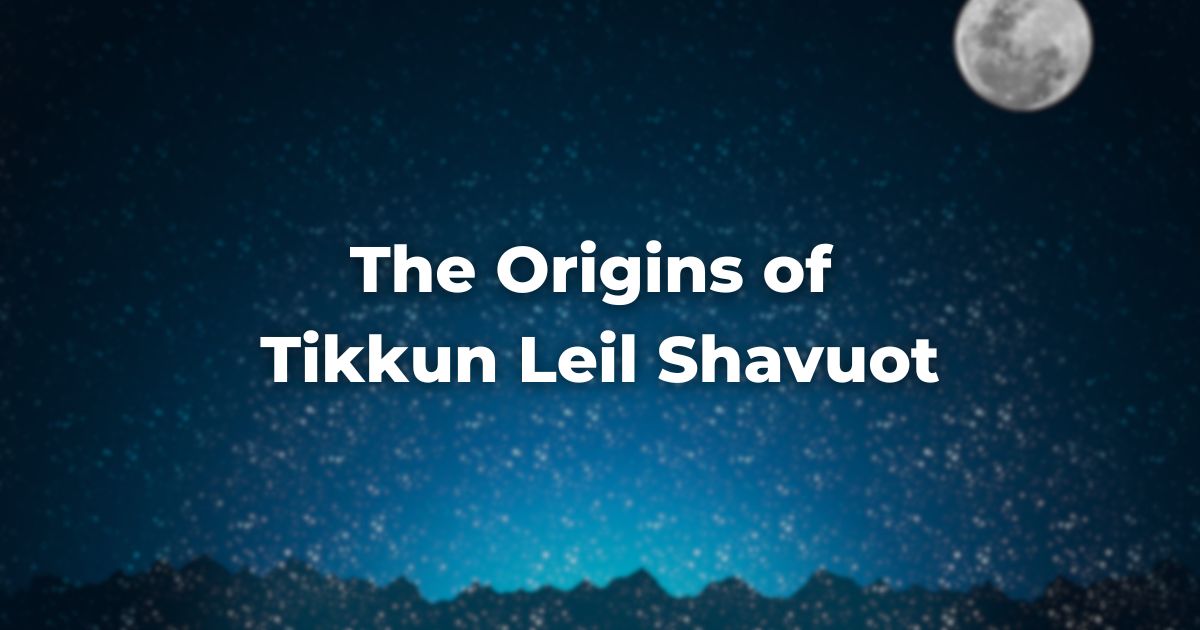On the first night of Shavuot, synagogues, community centers, and homes around the world fill with the sound of learning. People gather late into the night, studying TorahRefers to the first five books of the Hebrew Bible, the Tanakh, also called the Five Books of Moses, Pentateuch or the Hebrew equivalent, Humash. This is also called the Written Torah. The term may also refer to teachings that expound on Jewish tradition. Read more together.
But where did this tradition of staying awake all night, known as Tikkun Leil Shavuot, come from? And what is it meant to accomplish?
Understanding its background helps us approach Shavuot with more meaning, whether or not we manage to stay up until sunrise.
The Custom Begins: Mystics and Memory
The custom of staying awake on Shavuot night likely began in the 1500s, particularly among the Jewish mystics living in Tzfat, led by figures like Rabbi Isaac Luria and Rabbi Yosef Karo. It was later recorded explicitly in the 17th century by the Magen Avraham, a commentary on the Shulchan Arukh (Orach Chayim 494:1).
Magen Avraham wrote:
It is stated in the Zohar that the early pious ones would stay awake all night and engage in Torah study. And already most of those who study Torah have adopted this practice.
And it is possible to give a reason according to the simple meaning: because the Israelites slept all night and the Holy One, blessed be God, needed to wake them, as it is stated in the MidrashThis word is used in two ways, as both a concept and a literature. As a concept, midrash is the expansive interpretation of biblical texts. The term is used to describe the practice of rabbinic interpretation. As a text, it refers to specific collections of interpretations, particularly from the third to ninth centuries in the Land of Israel and Babylonia. Plural: Midrashim
Read more. Therefore, we need to rectify this.
(Magen Avraham, Orach Chayim 494:1)
In other words, both mystical and practical reasons shaped this tradition. Staying awake connects us to the early mystics’ spiritual preparation and also serves as a repair for a past mistake.
Let’s unpack both of those. What kind of repair is he talking about?
Two Sources: Why Stay Awake?
Magen Avraham points to two earlier sources, one from the Midrash and one from the Zohar, that frame the meaning behind the practice.
A Wake-Up Call from Sinai
The Midrash tells a striking story about the day the Torah was given. According to Shir HaShirim Rabbah:
Israel slept through that entire night because sleep during [the season of] Shavuot is pleasant and the night is short. Rabbi Yudan said: Not even a flea stung them. The Holy One blessed be He came and found them asleep.
(Shir HaShirim Rabbah 1:12)
The Midrash explains that the Israelites fell asleep at the giving of the Torah because the early Summer has great weather! More to the point, God is there to give them the Torah and the Israelites are caught snoozing and unprepared for the moment.
Thus, staying awake on Shavuot night, repairs (l’taken, from the same root as tikkun) that moment. By studying all night, our practice demonstrates that we are ready, attentive, and eager for Torah, making up for our ancestors.
Preparing the Bride
The Zohar offers a deeper, more mystical image. In Zohar Emor 98a, we read:
Thus, the earlier pious ones did not sleep on this night [Shavuot], and they studied Torah, saying: Let us acquire a holy inheritance for us and our children in two worlds….
Rabbi Shimon would say, when the Hevraya gathered around him on this night: ‘Let us array the jewels of the Bride, so tomorrow she will appear before the King suitably adorned and bedecked.
(Zohar Emor 98a)
Here, Shavuot is portrayed as a cosmic wedding. Torah is the bride, and those who stay awake are compared to companions preparing her for her meeting with the King.
Therefore, we can become like those described in the Zohar, assisting the partnership of Torah and God.
Two Threads, One Night
Tikkun Leil Shavuot lives between two deep ideas, according to the Magen Avraham:
- Human Responsibility: repairing the oversleeping of Sinai.
- Mystical joy: adorning the Torah as a bride.
Both perspectives can deepen the meaning of the night, drawing heaven and earth closer together. Staying up through the night is not just about endurance, it’s about internal readiness, the beauty of Torah, and spiritual preparation.
What About Today?
In many communities today, people gather to study all night.
Some follow a set order of texts, known as a tikkun, reading selections from the Torah, Prophets, Writings, MishnahA collection of rabbinic teachings edited in Israel around 225 CE. Organized in six sedaraim by subject matter and dealing with both ritual and civil law. Both the Jerusalem and Babylonian Talmud are expansive discussions of the Mishnah. Read more, and Zohar. Others organize lectures, hevrutaA study partner. A hevruta is more than just a ‘study buddy’ it is a serious and personal relationship between colleagues. Also spelled: Havruta Read more (partner learning), or creative sessions that explore Torah’s many dimensions.
But it’s important to remember: staying up all night is beautiful, not obligatory.
The halakhic collection Peninei Halakhah reminds us:
Following this custom is not obligatory. If it is difficult to stay up all night studying Torah, one may go to sleep. Even some great rabbis preferred to sleep on Shavuot night… [if] they would not be bale to focus on praying in the morning, or learn properly [it would not be worth staying up late]…
(Peninei Halakhah, Festivals 13:8:7)
The real moment of receiving Torah happens in the morning, when we hear the reading of the Ten Commandments.
What matters most is not endurance, but presence. So recognize what’s best for you.
Whether you stay up all night, study for an hour, or get a full night’s rest, the heart of Shavuot remains the same: showing up, awake in spirit, ready to meet Torah once again.
The tradition of Tikkun Leil Shavuot invites us into a night of preparation and a morning of revelation.
Author
-

Rabbi Jeremy Markiz is a teacher and consultant. Based in the Washington, DC area, he teaches the Torah of personal growth, meaning and intentionality, and making the world a better place. He writes a newsletter called, With Torah and Love. Rabbi Markiz helps clergy, congregations, and Jewish organizations grow and communicate clearly in the digital world, develop effective strategies, and solve problems with his consulting firm, Next Level Rabbinics.
View all posts




